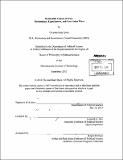Rationalist causes of war : mechanisms, experiments, and East Asian wars
Author(s)
Quek, Ch-yuan Kaiy
DownloadFull printable version (20.71Mb)
Other Contributors
Massachusetts Institute of Technology. Department of Political Science.
Advisor
Kenneth A. Oye.
Terms of use
Metadata
Show full item recordAbstract
This dissertation specifies and tests rationalist mechanisms of war. Why would rational states fight each other despite their incentives for peaceful bargains that would avoid the costs of war? In the rationalist theory of war, private information and the commitment problem are the key causes of war. I study the effects of these factors - and the mechanisms regulating their effects - through randomized experiments, historical analysis of the decision processes in three wars, and a comparative study of all international wars fought in East Asia in the last century. This is the first integrated study of rationalist causes of war that combines randomized experiments with historical cases. Despite a wide theoretical literature, there are few empirical tests of rationalist explanations for war. I use experimental and historical evidence to show that the commitment problem has strong positive effects on conflict. The effects of private information are less clear. Next, I specify six mechanisms that regulate the effects of the commitment problem and the private-information problem: three mechanisms (exogenous, endogenous, and inadvertent enforcement) for the first problem and three mechanisms (signaling with sunk cost, implementation cost, and salient contradiction) for the second. The experimental and historical evidence largely converge. Each of the three enforcement mechanisms calms the commitment problem and reduces the risk of conflict. Evidence for the three signaling mechanisms is mixed. Finally, I use the case universe of East Asian wars to assess the relevance of the mechanisms, suggest theoretical refinements, and infer alternative theories of war.
Description
Thesis (Ph. D.)--Massachusetts Institute of Technology, Dept. of Political Science, 2013. Cataloged from PDF version of thesis. Includes bibliographical references.
Date issued
2013Department
Massachusetts Institute of Technology. Department of Political SciencePublisher
Massachusetts Institute of Technology
Keywords
Political Science.